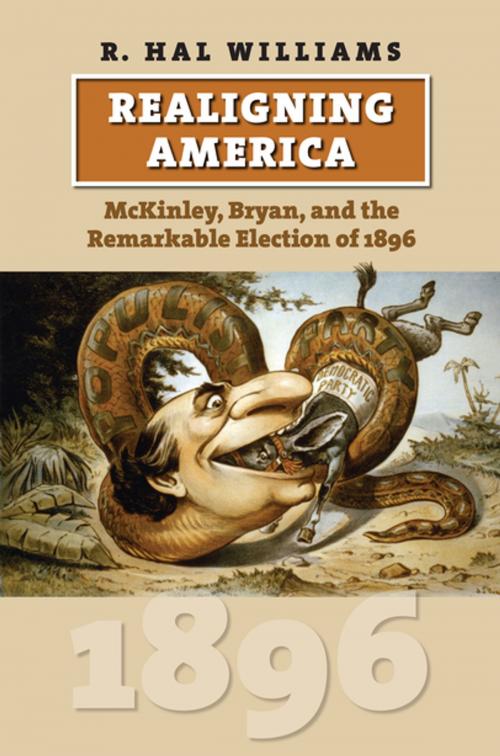Realigning America
McKinley, Bryan, and the Remarkable Election of 1896
Nonfiction, Social & Cultural Studies, Political Science, Government, Political Parties, Elections, Politics, History & Theory| Author: | R. Hal Williams | ISBN: | 9780700625413 |
| Publisher: | University Press of Kansas | Publication: | October 20, 2017 |
| Imprint: | University Press of Kansas | Language: | English |
| Author: | R. Hal Williams |
| ISBN: | 9780700625413 |
| Publisher: | University Press of Kansas |
| Publication: | October 20, 2017 |
| Imprint: | University Press of Kansas |
| Language: | English |
The presidential election of 1896 is widely acknowledged as one of only a few that brought about fundamental realignments in American politics. New voting patterns replaced old, a new majority party came to power, and national policies shifted to reflect new realities. R. Hal Williams now presents the first study of that campaign in nearly fifty years, offering fresh interpretations on the victory of Republican William McKinley over Democrat William Jennings Bryan.
In tracing the triumph of gold over silver in this fabled "battle of the standards," R. Hal Williams also tells how the Republicans—the party of central government, national authority, sound money, and activism—pulled off a stunning win over the Democrats—the party of state's rights, decentralization, inflation, and limited government. Meanwhile the People's Party, one of the most prominent third parties in the country's history, which also nominated Bryan, went down to a defeat from which it would never recover.
Williams plunges readers into a contest that set new standards in financing, organization, and accountability, and he analyzes the transition from the long-dominant "military style" of campaign to the "educational style" that appealed to a savvier electorate. He also presents key players in new light: he views Bryan not simply as a gifted speaker whose "Cross of Gold" speech took the Democratic convention by storm, but as a more calculating politician with his eye squarely on the nomination; he depicts McKinley's campaign manager Mark Hanna not as the one-dimensional fundraising machine painted by history but rather as a shrewd, insightful politician who understood what was required to get his man elected; and he presents retiring president Cleveland as an increasingly out-of-touch, irrelevant chief executive whom the Democrats repudiated in a way no other party ever had a sitting president.
With the Republicans' star on the rise and the Democrats banished to the South and the cities, the 1896 election was more than a victory of one party over another, it marked the emergence of new ways of politicking that makes this campaign especially relevant for twenty-first-century readers.
The presidential election of 1896 is widely acknowledged as one of only a few that brought about fundamental realignments in American politics. New voting patterns replaced old, a new majority party came to power, and national policies shifted to reflect new realities. R. Hal Williams now presents the first study of that campaign in nearly fifty years, offering fresh interpretations on the victory of Republican William McKinley over Democrat William Jennings Bryan.
In tracing the triumph of gold over silver in this fabled "battle of the standards," R. Hal Williams also tells how the Republicans—the party of central government, national authority, sound money, and activism—pulled off a stunning win over the Democrats—the party of state's rights, decentralization, inflation, and limited government. Meanwhile the People's Party, one of the most prominent third parties in the country's history, which also nominated Bryan, went down to a defeat from which it would never recover.
Williams plunges readers into a contest that set new standards in financing, organization, and accountability, and he analyzes the transition from the long-dominant "military style" of campaign to the "educational style" that appealed to a savvier electorate. He also presents key players in new light: he views Bryan not simply as a gifted speaker whose "Cross of Gold" speech took the Democratic convention by storm, but as a more calculating politician with his eye squarely on the nomination; he depicts McKinley's campaign manager Mark Hanna not as the one-dimensional fundraising machine painted by history but rather as a shrewd, insightful politician who understood what was required to get his man elected; and he presents retiring president Cleveland as an increasingly out-of-touch, irrelevant chief executive whom the Democrats repudiated in a way no other party ever had a sitting president.
With the Republicans' star on the rise and the Democrats banished to the South and the cities, the 1896 election was more than a victory of one party over another, it marked the emergence of new ways of politicking that makes this campaign especially relevant for twenty-first-century readers.















